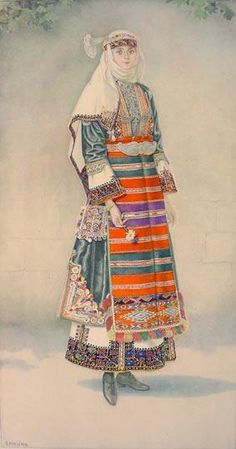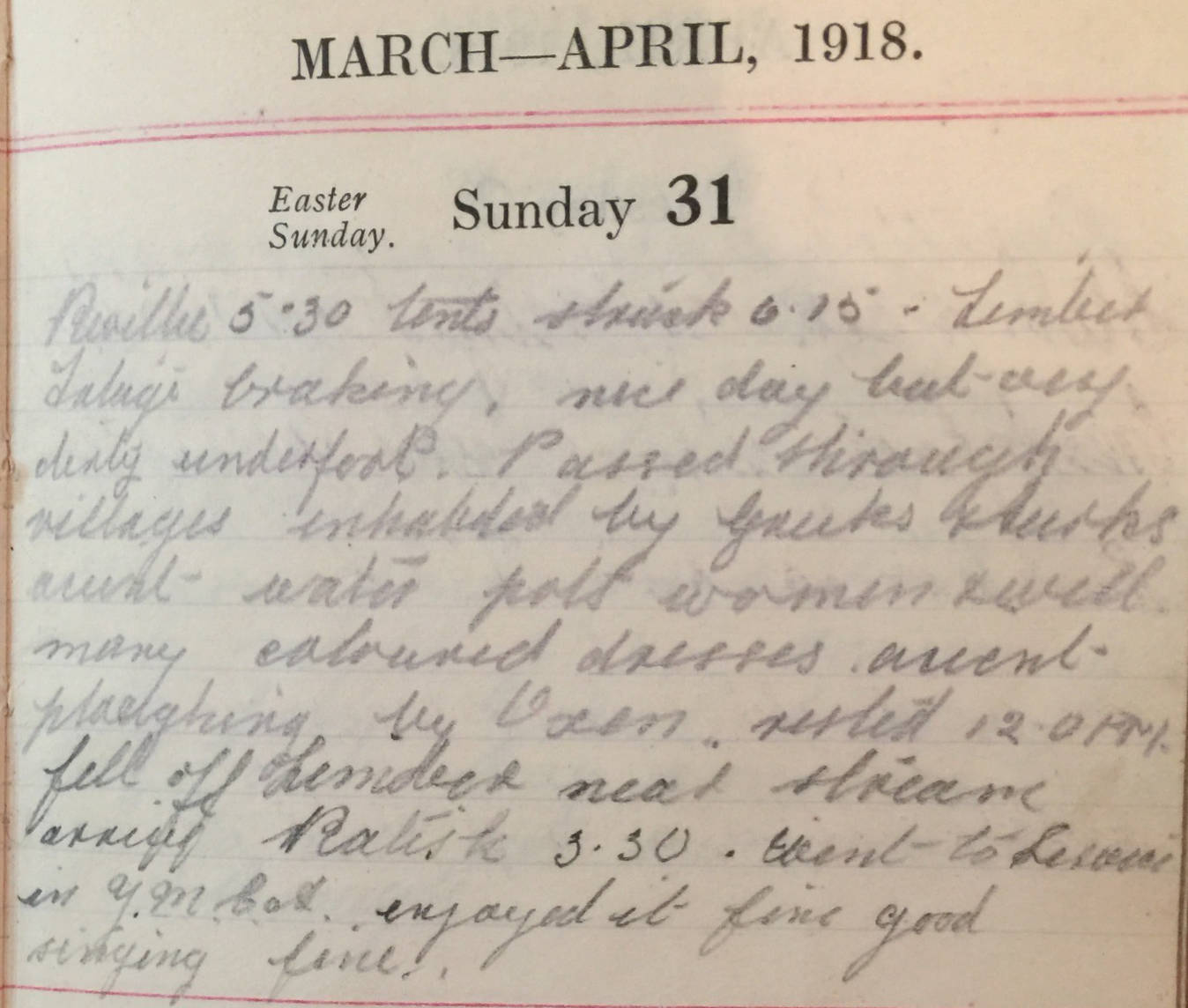Sunday March 31st, 1918
Easter Sunday.
Reveille 5:30, tents struck 6:15. Limber fatigues braking. Nice day but very dirty underfoot. Passed through villages inhabited by Greeks and Turks. Ancient water pots, women with many coloured dresses. Ancient ploughing by oxen. Rested 12 noon. Fell off Limber† near stream. Arrive Rates at 3:30. Went to service in YMCA. Enjoyed it fine. Good singing – fine.
Easter Sunday?
Today is Easter Sunday for the British, French and Italians stationed in Macedonia. However, for their hosts , at least those of the Greek Orthodox faith, Easter Sunday is more than a month away. This is because the western churches use the Gregorian calendar and the Orthodox churches use the older, Julian calendar. Occasionally the dates coincide (the last time was in 2014). However for the Greek Orthodox in 1918, Easter Sunday will be on May 5th, 1918.¹
The Julian calendar, adopted during the time of Julius Caesar began to be replaced by the more accurate Gregorian calendar in the late 16th century. Most countries in the world have now adopted the Gregorian calendar (Greece made the change for civil purposes in 1923). However most Orthodox churches still use the Gregorian calendar to calculate religious festivals.²
The Greek Countryside

The Battalion dismantled the camp at Olasli yesterday and today is marching to Rates. According to the Operation Order, the men are to wear steel helmets and ‘strict march discipline is to be observed. Smoking will not be permitted except at halts. Water bottles are not to be used until after the second halt. Ten minute halts will be made each hour.’ ³
En route they pass through Greek villages. Frank notes their ancient water pots and women in colourful costumes. In the fields, oxen are being used to plough the fields. Despite the military precision of the march, it all sounds very bucolic.
Archibald Don wrote to a friend, Brita Soneson, about the colourful fabrics used by Greek women in Aivatli. ‘You would be interested in the handlooms of this village, and enjoy their gay cloths and aprons of many colours. They make several effective bodice and skirt materials – one in stripes of dark blue and green is most effective – and a jolly shot blue and red reminded me of some of your own cloths.’º
Archibald would buy and send Brita a variety of samples in the coming weeks.
This sketch shows a woman’s colourful, festive costume from Greek Macedonia in the early 20th century.
Clickety Clicks
From his diary it sounds like Frank went to the Divine Service. However an alternative attraction, also in Rates this evening, is a concert performance by the Clickety Clicks. He might well have gone there instead.
The BWD identifies the Clickety Clicks as the concert party of the 66th Brigade. However, other sources identify them as the concert party of the 22nd Division, of which the 66th was a part. Concert parties were incredibly popular entertainment for the troops and there were a variety of such amateur troupes in Salonika. There were also concert parties made up of professional artists. These entertained mainly in France and sometime further afield, though none seem to have visited Salonika. Whether Frank opted for the religious or secular entertainment today – we know that he enjoyed it.
13th (Service) Battalion War Diary – 31st March 1918 – No 1 Sector, Olasli
The Battalion marched out according to programme and were all present at Rates by 15:00 hrs. A large number of men attended a performance given by the ‘Clickety Clicks’ (The 66th Brigade Concert Party) at 18:00 hrs, this was much appreciated.
The health of the Battalion is good. The weather has been warm and fine except for a bad cold snap for four days at the commencement and about the same at the end of the month.
The effective strength of the Battalion is 33 Officers and 997 other ranks.
JFB Morrell, Lieut Col
Officer Commanding the 13th (S) Battalion, Manchester Regiment
References & Further Reading
¹ Orthodox Easter Date List from 1900 to 1924 on World-Timedate.com
² Julian calendar on Wikipedia
³ Operation Order No 34, Appendix 4 of the Battalion War Diary of the 13th Manchesters.
º ‘Archibald Don – A Memoir’ (1890-1916), page 139
* image may be subject to copyright
† corrected in light of Charlie’s comment on the post. I originally thought it a place name ‘Lemdeir’!



Caroline,
You are right with fatigue, it matches the previous entries and I agree with your interpretation.
As Frank does not record any injuries from his fall, one can only assume that the only thing that was hurt was his pride.!
You wouldn’t believe how long I looked at the map for the place he had stopped. I thought ‘fell off’ was being used like ‘fall out’ when marching. As you say – only his pride would be hurt.
Hi Caroline,
I think Frank was detailed to act as a Brakeman on „limber Falugi“. Did the army supplement their transport by hiring civilian wagons? Or did they give their transport names e.g. wagon E was given a name like Eric? What do you think?
One thing is for certain, he fell off the limber near the stream. Perhaps he had fallen asleep, who knows.
Charlie
This makes the entry much more interesting! Do you think Frank is using ‘fatigue’ to describe the work of being the brakeman? Looking at the word, it seems to be the way he wrote ‘fatigue’ (never really spelt correctly…) – see Jan 18 & 19 as examples.
You are quite right though – whatever braking work he was doing or not doing – he fell off!!
Caroline